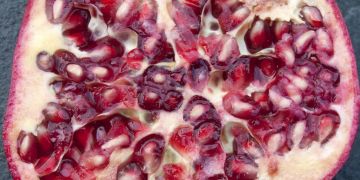History of Pomegranates
The word, pomegranate, comes from the Latin words, pomum, which means "apple", and granatum, meaning "seeded". The pomegranate tree bears a roundish fruit with a deep red coloring that contain hundreds of seeds surrounded by an edible pulp, known as the aril. This fruit is cultivated in many countries around the world, but especially thrives in a Mediterranean climate. The pomegranate tree originated from the Persian region as early as 3,000 B.C., but was brought to the Western Hemisphere by Spanish colonists in the eighteenth century.
Health Benefits of Pomegranate
Throughout history, the pomegranate was used in various remedies to heal ailments ranging from diarrhea to nose bleeds. The Indian culture has used pomegranates extensively in Ayurvedic medicine for thousands of years, and they even use pomegranate juice as eye drops to help with cataracts.
High in Antioxidants
Pomegranates contain antioxidants that are believed to fight against free radicals, which are harmful cells that can become cancerous, in the body. This fruit is also a great source of Vitamins A, C and E, and contains folic acid. It is great for boosting the immune system as one pomegranate contains about 40 percent of an adult's recommended Vitamin C intake, and it also has a large amount of polyphenols, which are antioxidants known for helping fight various diseases. Other benefits of this fruit include: reducing the risk of heart disease, decreasing the risk of Alzheimer's disease, and promoting healthy skin. Properties in pomegranates help keep bad cholesterol from clogging up the arteries, supporting proper blood flow to the heart, and some studies have shown a reduction in systolic blood pressure when drinking pomegranate juice.
Abundant in natural Phenols
Some of the key components that give the pomegranate its healthy benefits is the abundant amount of natural phenols, such as ellagitannins and flavonoids, found within its pulp. These antioxidants are incredibly beneficial to the human body as they help fight allergies, intestinal problems, carcinogens and inflammation.
Improves the Skin
Another reason to partake in pomegranates is that it is widely believed to improve the skin. Some countries hold this fruit in high regard mainly because they believe that it fights wrinkles and gives the skin a healthy glow. Pomegranate seed oil is known to speed up wound healing and prevent scars.
Reproductive Health
Pomegranates are also conducive to a healthy reproductive system. In ancient Greece, this fruit was a symbol of fertility. Pregnant women have been known to use the fruit to reduce the risk of premature birth, and some women rely on the pomegranate to assist with the side effect of fatigue due to menopause.
How to Consume Pomegranate
The average daily recommended intake of the pomegranate varies depending on which way it is being ingested. As well as being eaten fresh, pomegranates also come in the form of teas, capsules and juices, and in topical beauty treatments. Because no specific guidelines have been established, suggested doses range from 50 ML to 240 ML a day. Most studies report that up to 12 ounces a day is a safe intake amount for adults.
Pomegranates are extremely beneficial in improving overall health in a natural way.





